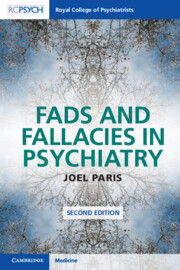
-
Select format
-
- Publisher:
- Cambridge University Press
- Publication date:
- 16 March 2023
- 23 March 2023
- ISBN:
- 9781009245746
- 9781009245739
- Dimensions:
- Weight & Pages:
- Dimensions:
- (234 x 156 mm)
- Weight & Pages:
- 0.25kg, 152 Pages
You may already have access via personal or institutional login
Book description
This text examines the fads and fallacies, both past and present, that have plagued psychiatric diagnosis, treatments and research. It argues that such practices have led to an over-diagnosis of conditions such as depression, bipolar disorder, ADHD, PTSD and autism. It examines the over-treatment of psychiatric disorders with pharmaceuticals, and asks if neuroscience will actually hold the answers to the biggest questions in the field. Thoroughly updated in light of new research, this new edition addresses some of the more recent developments in psychiatry, including behavioural genetics, genome-wide association studies, and brain imaging. It looks at new advances in psychotherapies and argues for a broad biopsychosocial model. The book will inform psychiatrists, clinical psychologists, other mental health professionals, and medical students of the limits of mental health practice and the importance of adopting cautious conservatism and the principles of evidence-based practice.
Contents
Metrics
Altmetric attention score
Full text views
Full text views help Loading metrics...
Loading metrics...
* Views captured on Cambridge Core between #date#. This data will be updated every 24 hours.
Usage data cannot currently be displayed.
Accessibility standard: Unknown
Why this information is here
This section outlines the accessibility features of this content - including support for screen readers, full keyboard navigation and high-contrast display options. This may not be relevant for you.
Accessibility Information
Accessibility compliance for the PDF of this book is currently unknown and may be updated in the future.


